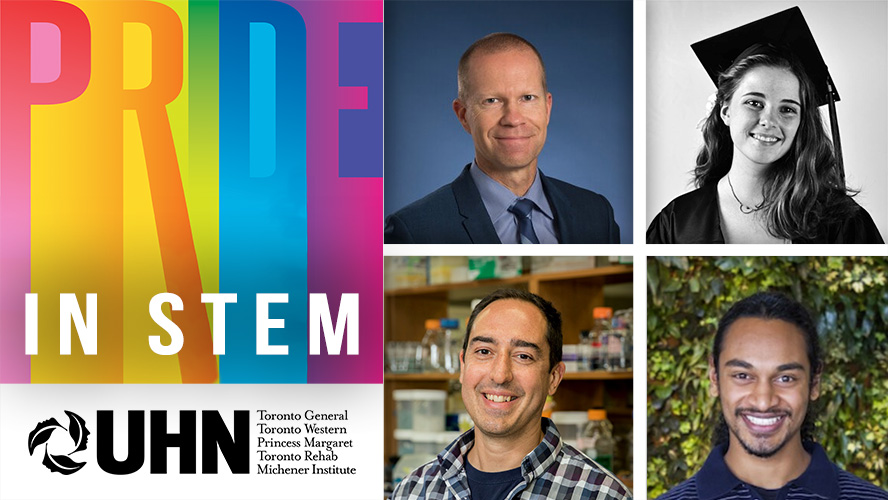
At the end of 2023, UHN held its inaugural Pride in STEM (Science, Technology, Engineering, and Math) event: a panel to celebrate the life and sciences of 2SLGBTQIA+ people in STEM.
Hosted by Dr. Brian Hodges, Executive Vice President, Education & Chief Medical Officer at UHN, the virtual panel provided the opportunity for members of UHN and the public to learn from panelists about what it is like being a queer person in the sciences.
The panel was organized by UHN’s Research IDEA committee (Inclusion, Diversity, Equity, and Accessibility) and included the following panelists:
- Sydney O’Brien, a research technician at the University of California, San Diego studying gene expression in the immune cells of the brain. Sydney has also served as president of the student organization Out in STEM (oSTEM) at San Diego State University.
- Dr. Gerd Prehna, Associate Professor in the Department of Microbiology at the University of Manitoba studying how bacteria communicate with their hosts and each other.
- Dr. Dylan Siriwardena, a developmental biologist and Postdoctoral Researcher at the University of Toronto where he is developing prenatal genetic tests for early pregnancy.
One major topic of discussion was how the identities of being a scientist and a member of the queer community intersect. Speakers shared what makes their research meaningful to them and to the 2SLGBTQIA+ community and discussed what it feels like to be a part of both the queer and science communities.
“As scientists, the work we do can have ethical and social meaning, especially within the 2SLGTBQIA+ community. This can particularly ring true when researching diseases that may be marginalized because of the communities they are associated with,” noted Dr. Hodges.
Discussions also touched upon coming out in professional settings, such as institutional, university, or lab environments, and how this is complex for many individuals.
While Dr. Gerd Prehna spoke about the importance of being open and visible as a faculty member to enhance representation, panelists also brought up the specific burden for queer people of needing to repeatedly come out in new social spaces. Panelists emphasized that levels of comfort with disclosure vary between different situations such as sharing with friends, colleagues, and the public.
Additionally, panelists acknowledged that despite their comfort and certainty in being “out”, fear and nervousness can persist regarding speaking publicly about one’s identity, even for prominent members of the 2SLGBTQIA+ community and in seemingly progressive times. One panelist noted an inner moment of hesitation when being invited to the panel and being a visible part of the 2SLGBTQIA+ –focused event, highlighting the ongoing challenges of having a marginalized identity.
Panelists agreed that events like Pride in STEM are important in making sure that everyone is welcome within the science community. “Science is for everyone, and it is crucial to have events within the science community where you can be open about who you are and however you identify,” said Dr. Siriwardena.
In addition to events like these, the panel discussed other ways the science community can create an inclusive space such as visibly identifying your environment as a safe space, welcoming people into the lab to express all parts of who they are, and actively addressing hurtful or discriminatory comments.
Improvements are also still needed in other areas. “Resources on campuses are sometimes mainly geared towards undergraduates, leaving other employee groups in need of more support,” noted Sydney O’Brien. In addition, there are currently no awards and/or fellowships that specifically recognize queer scientists. Lobbying funding agencies and universities for this type of acknowledgment is a necessary next step.
To learn more about these topics watch the full panel discussion, click here.
The IDEA committee is also planning an Accessibility in STEM panel for spring 2024. Stay tuned for more details when they become available.
For more information about IDEA at UHN please contact edi@uhnresearch.ca.

